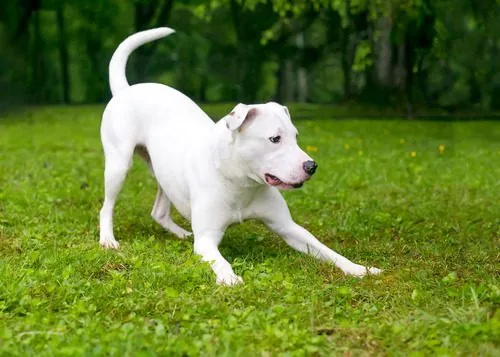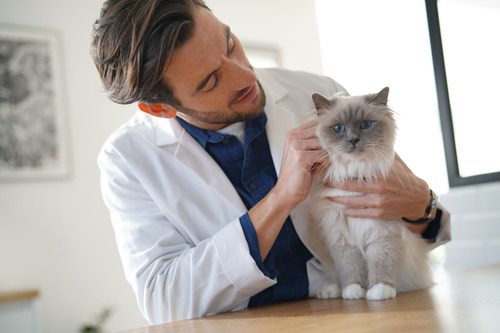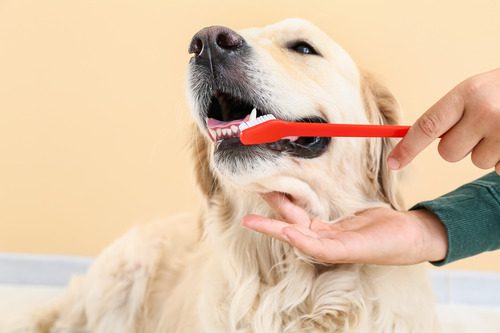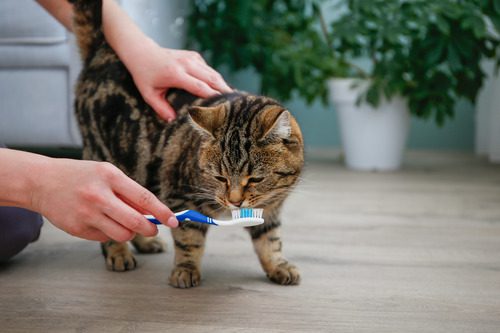Why Are My Pet’s Teeth Yellow?
If you notice your pet’s teeth look a little yellow, this might make you wonder what’s going on. Yellow teeth in pets can be a sign of several things, from simple aging to early-stage dental disease. Here at Providence Veterinary Hospital and Clinic in Alameda, California, we understand how important your pet’s dental health is to you. This blog will explore the reasons behind yellow teeth in pets and what it could mean for their health. If you find yourself concerned about your pet’s oral health, we’re here to help. Feel free to call us at (510) 521-6608 or (510) 521-5775 for more information or to schedule an appointment.
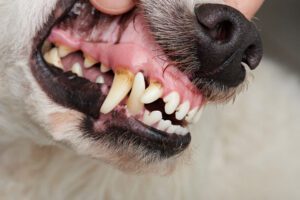
The Basics of Pet Dental Health
Understanding why your pet’s teeth are yellow starts with knowing a bit about pet dental health. Just like humans, pets can get plaque and tartar build-up on their teeth. Over time, this can lead to yellowing. Regular dental care, including brushing your pet’s teeth and providing dental-friendly toys and treats, can prevent some of this discoloration. But there’s more to it than just surface stains.
Causes of Yellow Teeth in Pets
Several factors can contribute to your pet’s teeth turning yellow. Here are a few key reasons:
Age-Related Changes
As dogs and cats age, it’s natural for their teeth to become less white. This is due to the enamel wearing down over time, which allows the dentin, a yellow-colored tissue beneath the enamel, to show through.
Plaque and Tartar Build-Up
Plaque is a sticky film of food and bacteria that forms on teeth. If not removed, it can harden into tartar, a more solid material that sticks to the teeth and contributes to yellowing. Tartar build-up can also lead to gum disease, which is why it’s so important to maintain good dental hygiene for your pet.
Diet and Chew Habits
What your pet eats and chews on can also affect the color of their teeth. Certain foods and chew toys can contribute to staining and yellowing over time. Providing a balanced diet and safe, veterinarian-approved chew toys can help minimize this risk.
Health Issues
Sometimes, yellow teeth can indicate more serious health issues. Dental diseases, like gingivitis or periodontal disease, can cause yellowing. Other health problems, unrelated to dental health, can also have an impact on tooth color. In some cases, yellowing teeth can indicate liver disease. The liver plays a crucial role in your pet’s body by filtering toxins. When it’s not functioning properly, one of the symptoms can be changes in tooth color.
Kidney disease can also cause dental changes in pets. Since the kidneys are responsible for filtering waste and toxins from the blood, their failure can lead to a buildup of substances that may contribute to yellowing teeth.
Preventing Yellow Teeth
While some factors leading to yellow teeth can’t be completely avoided, there are steps you can take to help keep your pet’s teeth as healthy as possible:
- Regular brushing with pet-safe toothpaste
- Providing dental health chews and toys
- Feeding a balanced diet designed to promote dental health
- Scheduling regular dental check-ups with your vet
At Providence Veterinary Hospital and Clinic, we can guide you on the best practices for your pet’s dental care and recommend products and diets that support healthy teeth.
Schedule Your Pet’s Dental Check-up with Us
If your pet’s teeth are yellowing, it’s a good idea to schedule a dental check-up. This is especially important if you notice other symptoms, like bad breath, difficulty eating, or swollen gums, as these can be signs of dental disease. Our team at Providence Veterinary Hospital and Clinic is here to help. We’ll examine your pet’s teeth, determine the cause of the yellowing, and suggest the best treatment plan.
If you’re concerned about your pet’s dental health or have noticed their teeth turning yellow, give us a call at (510) 521-6608 or (510) 521-5775. Let’s work together to keep your pet’s smile bright and healthy.
Recent Posts
What Does Your Dog’s Tail Wag Really Mean?
What Does Your Dog’s Tail Wag Really Mean? Dogs use their tails for much more than just…
Feline Leukemia: Prevention and Detection
Feline Leukemia: Prevention and Detection Cat Feline Leukemia is a serious viral disease that affects felines worldwide….
A Team Effort: How Home Care and Professional Cleanings Keep Your Dog’s Teeth Healthy
A Team Effort: How Home Care and Professional Cleanings Keep Your Dog’s Teeth Healthy Dental health is…
The Perfect Pair: Home Care and Professional Cleanings for Your Cat’s Teeth
The Perfect Pair: Home Care and Professional Cleanings for Your Cat’s Teeth Caring for your cat’s teeth…
What is Bordetella and Why Should You Care?
What is Bordetella and Why Should You Care? Bordetella is a term many pet owners hear when…
Providence Veterinary Hospital & Clinic serve Alameda, CA as well as Oakland, San Leandro, and the surrounding areas with superb veterinary medicine and gentle, compassionate care. We’ve been a part of this community since 1947 when a veterinarian started seeing pets in his home after the end of World War II. He built an animal hospital right under his house, and that’s where we remain to this day (with modern remodeling in 2016, to outfit the hospital with the latest medical technology and equipment, of course!).

